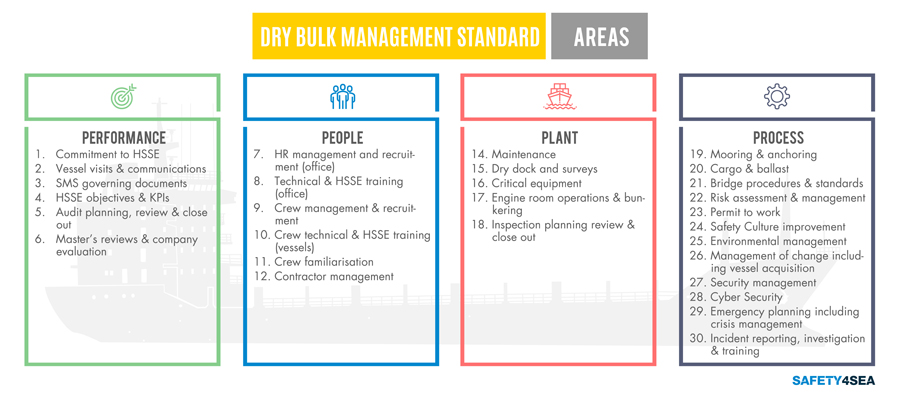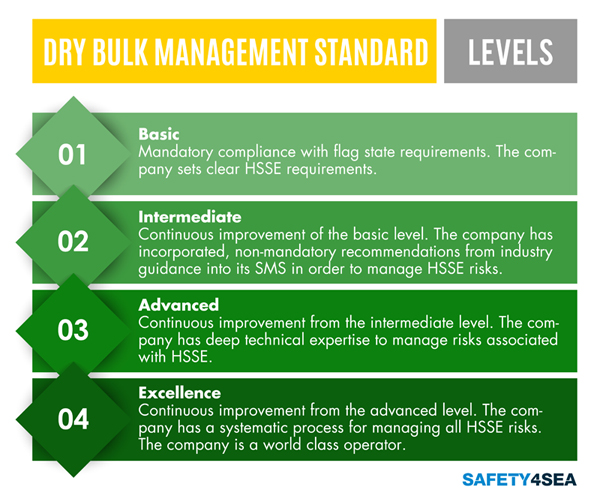RightShip, INTERCARGO jointly launch standard for safety in dry bulk s…
페이지 정보
작성자 최고관리자 댓글 0건 조회 1,644회 작성일 21-01-29 19:07본문
RightShip, INTERCARGO jointly launch standard for safety in dry bulk sector
RightShip joined forces with INTERCARGO launching a new quality standard for the dry bulk sector which aims to improve the safety within the sector.
Safety | 21/01/21
Accordingly, the two partners, with the support of BIMCO and the International Chamber of Shipping, launched the DryBMS(첨부참조), which exists as a simple set of best practices and key performance indicators, and raise the bar on safety, environmental and operational excellence.
It is reported that the standard will be governed by a new NGO to be established later this year and will support the improvement of safety in the dry bulk segment.
RightShip and INTERCARGO expressed their gratefulness to the joint secretaries, project managers, the industry experts as well as the observers from ICS and BIMCO, for their great support leading up to this important milestone.
In a press statement, Dimitrios Fafalios, Chairman of INTERCARGO, commented that
We cannot achieve the best possible result without input from a broad range of maritime organizations. Each viewpoint helps us gain a comprehensive insight into the needs and wants of our industry.
In addition, RightShip’s CEO Steen Lund stated that the standard is a project of extensive collaboration with many stakeholders within the dry bulk sector. "We believe that this ensures the program will be supported and adopted across the industry as a whole. The rapid delivery of the initial consultation document means that we are a step closer to providing consistent, meaningful safety expectations for the dry bulk industry," added Mr. Lund.
From December 2020, Mr. Steen Lund is the new CEO of RightShip, succeeding Martin Crawford-Brunt. In a recent interview, Mr Lund shared his top priorities on the agenda, emphasizing on the benefits of standardisation in inspections and vetting. Last year, RightShip launches of a new dry bulk management standard(아래 기사 참조), the so-called DBMS, to enhance safety in the dry bulk sector.
Supporting the new DryBMS, David Loosley, Secretary General & CEO of BIMCO highlighted that although safety of people, environment and assets is the primary focus of this new standard, the anticipated cascading effect is operational excellence which will benefit all stakeholders.
In addition, Guy Platten, Secretary General of International Chamber of Shipping noted that the introduction of DryBMS is yet another example of the industries continued efforts to raise the bar on safety, environmental impact and operational excellence.
----------------------------------------------------------------
Rightship launches New Dry Bulk Management Standard
RightShip announced a new program for the dry bulk sector which aims to ensure the highest levels of safety, security and environmental excellence. The new Dry Bulk Management Standard (DBMS) aims to support the improvement of safety and risk management standards within dry bulk ship management and help drive collaboration, conversation and increased standards in the sector.
Shipping | 02/04/20
The draft guidelines and standards have been created after months of collaboration with partners and operators across the dry bulk segment and the wider industry, including experienced ship managers and maritime experts.
Continued collaboration to improve the standards is encouraged, with owners, operators and managers all having the opportunity to submit their feedback and shape future iterations.
DBMS Key Objectives
The voluntary programme is designed to allow ship managers to measure their Safety Management System (SMS) against agreed industry standards, with the aim of improving fleet performance and risk management. This will ensure an operator’s policies align with industry best practice to both advance their performance and attain high standards of health, safety, security and pollution prevention.
DBMS will:
- Provide expectations and targets against which companies can assess their own safety management systems.
- Benchmark a company’s management system against four key levels: basic, intermediate, advanced and excellence.
- Allow the creation of self-assessment results that can be used to develop phased plans to support continuous improvement of ship management systems.
- Encourage companies to regularly review their self-assessment results against DBMS expectations and to create achievable plans for improvement.
Focus Areas
The draft guidelines focus on 30 areas of management practice across the four most serious risk areas faced in vessel operations; performance, people, plant and process. The DBMS will grade the excellence of a company’s SMS against measurable expectations and targets without involving the burdens of excessive inspections.

Namely, the tool consists of a draft self-assessment questionnaire for review by the industry to gather feedback and opportunities for improvement, as already explained, with the vision to launch a revised standard next year and to incorporate a dashboard. The dashboard will show how a company's self-assessment compares to other companies on a range of statistics that have been identified as indicators of good management.
The staff involved in self-assessing each area have a very importance role as they should identify and gather evidence in relation to the expectation and target for each stage. Some sources of evidence are: last self-assessment report, external audits of the company, internal audits and feedback from stakeholders.
The standard describes the scoring methodology and cites the PDCS cycle as a way of implementing continual improvement within companies' activities
Levels of DBMS Standard
Within each subject area, the standard provides expectations and associated targets at four levels, as shown on the graph below. In particular, each level describes the comprehensiveness of a company's management system in relation to the subject area. The expectation and associate targets can be used by a company to self-access their systems and processes.

It is worth mentioning that the DBMS won’t be a replacement for the ISM Code but it will build upon industry standards and provide a systematic approach to encourage ship managers to move from minimum compliance to operational excellence.
Additionally, DBMS will allow ship managers to stand out from the crowd, whilst also enabling them to pinpoint the most effective management upgrades required across their fleet, saving time and money.
Luke Fisher, Project Lead, DBMS, commented
“DBMS will help to accelerate an increase in standards, and also provide an attainable benchmark for maritime excellence. DBMS will also not stand still. In line with a segment that is being reshaped constantly, the guidelines and standards will themselves constantly evolve and develop with ongoing feedback from participants”
''A set of standards like DBMS has been missing from the dry bulk sector. It will allow companies individually, as well as the dry bulk industry as a whole, to gradually raise its level of safety.'' noted Antonis Sakellis, Safety & Quality Director, Neda Maritime Agency.
George Sarris, Managing Director, Enterprises Shipping and Trading S.A, said:
“New technologies and new regulations alone will not improve shipping standards, unless we perceive things differently. The enhancement of a safety culture across the industry is a necessity, and moving on from ‘paper compliance’ and ‘mandatory certification’ models to self-regulation and self-assessment will help us achieve our goals and bring about a better dry bulk segment.”
The story behind DBMS
The concept of a set of safety and risk management standards for dry bulk shipping was first seeded more than ten years ago by David Peel, Manager, EMEA at RightShip and George Sarris, Managing Director of Enterprises Shipping and Trading S.A. Over the last decade, Peel, Sarris and leading owners and operators from the global dry bulk industry have collaborated to bring the idea from concept to its current draft status, with a view to generally improving safety, sustainability and welfare for all vessels and crew operating within the segment.
Explore more about DBMS
The standards are still in their draft format to encourage input from all industry players. They can be found on the newly launched DBMS website, where owners and operators can download them and provide feedback.
첨부파일
- Rightship - Guidance for DryBulk Management Standard.pdf (697.3K) 0회 다운로드 | DATE : 2021-01-29 19:07:07
- 이전글Hong Kong extends ban of crew entrance to four countries 21.01.29
- 다음글Complexity of container stacks 21.01.29



